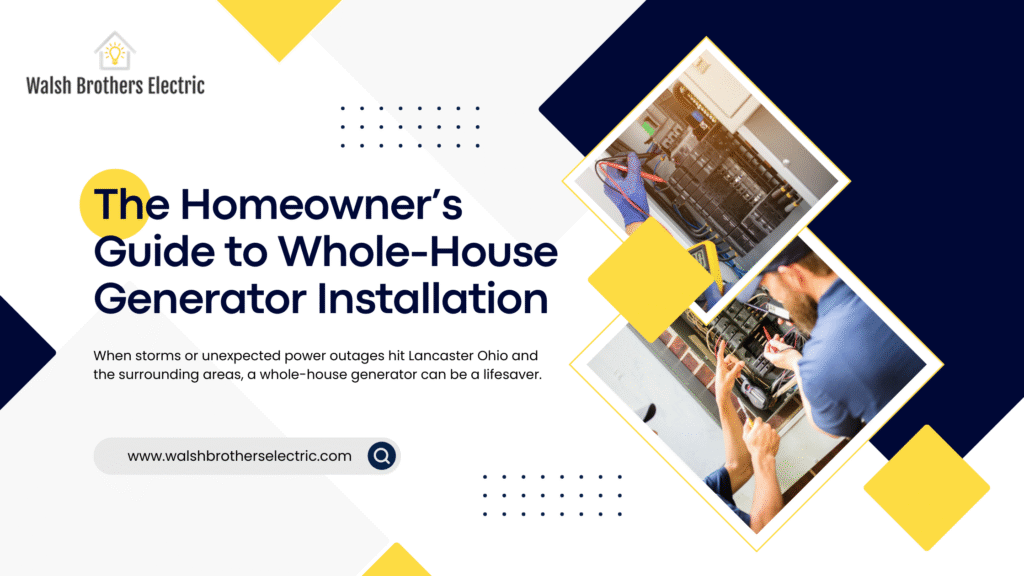The Homeowner’s Guide to Whole-House Generator Installation in Lancaster Ohio

When storms or unexpected power outages hit Lancaster Ohio and the surrounding areas, a whole-house generator can be a lifesaver. From keeping the lights on to protecting sensitive electronics, a standby generator gives you the peace of mind that your home will remain safe and comfortable no matter the weather. Power interruptions can happen during heavy thunderstorms, snowstorms, or when the electrical grid experiences unexpected issues. Without a reliable backup power source, homeowners can face spoiled food, frozen pipes, damaged electronics, and unsafe indoor conditions.
This comprehensive guide will explain why a whole-house generator is worth the investment, how to choose the right system for your home, and what to expect during the professional installation process. You will also learn about the importance of ongoing maintenance to keep your generator running efficiently for years to come.

Why Install a Whole-House Generator
A whole-house generator automatically powers your home when utility power is lost. Unlike portable units that require manual setup, extension cords, and constant refueling, a standby generator is permanently installed and wired directly into your home’s electrical system. The moment the power goes out, the generator detects the outage and begins supplying electricity within seconds.
The key benefits of a whole-house generator include:
- Continuous power during outages so you can maintain normal life
- Protection for appliances and electronics from damaging power surges
- Comfort in extreme weather by keeping heating or cooling systems running
- Automatic operation without manual intervention
- Increased home value and appeal to future buyers
In Lancaster Ohio, weather can be unpredictable. Summer storms can cause downed power lines while winter ice storms often result in days-long outages. For homeowners who work from home, have medical equipment, or want to protect their investment, installing a standby generator is a smart decision.
Choosing the Right Generator for Your Home
Selecting the right whole-house generator depends on your home’s size, your household’s energy needs, and your budget. Here are the most important factors to consider:
1. Power capacity
Generators are sized in kilowatts (kW) and you will need one large enough to run your essential systems. This may include your furnace, central air conditioning, refrigerator, sump pump, lighting, and certain outlets.
2. Fuel type
Whole-house generators are commonly powered by natural gas or propane. Natural gas offers an endless fuel supply if you are connected to a gas line, while propane is a good option for homes without gas service.
3. Noise level
If you live in a residential neighborhood in Lancaster, you may want a quieter unit that will not disturb you or your neighbors.
4. Brand and reliability
Top brands such as Generac and Kohler are known for long-term performance and nationwide service networks.
5. Budget and warranty
Consider both the initial installation cost and the long-term operating costs. Many high-quality models come with multi-year warranties for added protection.
Working with a licensed electrical contractor in Lancaster Ohio ensures your generator is properly sized, installed to code, and positioned for safe operation.

The Professional Installation Process
Professional installation is critical for both safety and efficiency. Here is what you can expect when hiring a licensed electrician in the Lancaster area for generator installation:
- Site assessment
Your contractor will evaluate your property to determine the best location for the generator. The unit must be positioned on a stable surface with proper clearance from your home and nearby structures. - Permits and approvals
Local building codes in Lancaster Ohio often require permits before installation. Your electrician will handle the permitting process and ensure compliance with all regulations. - Electrical panel integration
The generator will be connected to your home’s electrical system through a transfer switch. This allows for safe and seamless transition between utility power and generator power. - Fuel line connection
The unit will be connected to your natural gas line or propane tank. A qualified technician will ensure all connections are secure and leak-free. - System testing
After installation, the generator will be thoroughly tested to confirm proper operation under load. Your installer will also walk you through operation and maintenance basics.
A properly installed whole-house generator will start automatically during a power outage and shut itself off when utility service is restored.
Maintenance for Long-Term Reliability
Routine maintenance is essential to ensure your generator is always ready when you need it. Even the most reliable systems require regular inspections and service.
Basic maintenance tasks include:
- Checking oil, coolant, and fuel levels regularly
- Inspecting and tightening electrical connections
- Replacing air and fuel filters at recommended intervals
- Running the generator periodically to keep components lubricated
- Scheduling annual professional inspections
Many homeowners in Lancaster choose annual service agreements with a local electrician. This ensures that the unit receives thorough inspections, load testing, and any necessary software updates. Preventative care will help extend the life of your investment and reduce the risk of unexpected failures.
Why Work with a Local Licensed Electrician
While some homeowners are tempted to purchase and install a generator on their own, the process involves advanced electrical and fuel connections that should be handled by a professional. Hiring a licensed electrician in Lancaster Ohio ensures:
- Compliance with all local and state codes
- Safe fuel and electrical connections
- Proper sizing and placement of the unit
- Warranty protection from the manufacturer
Local contractors are also familiar with the specific weather challenges and building regulations in the area, which means they can recommend the most reliable solutions for your home.

Final Thoughts
A whole-house generator is more than a luxury. It is an essential safeguard for homeowners who want to protect their family, their comfort, and their investment during power outages. By working with a licensed electrical contractor in Lancaster Ohio, you can be confident that your generator will be installed safely, meet all code requirements, and provide reliable service for many years.
If you are ready to explore whole-house generator installation, contact Walsh Brothers Electric today to schedule a free consultation. Serving Lancaster Ohio and surrounding communities, they specialize in generator installation, maintenance, and repair for homeowners who value safety, comfort, and peace of mind.
ocal contractors are also familiar with the specific weather challenges and building regulations in the area, which means they can recommend the most reliable solutions for your home.
Frequently Asked Questions
1. What is a whole-house generator and how does it work?
A whole-house generator is a permanently installed backup power system that automatically turns on during a utility power outage. It’s wired directly into your home’s electrical panel through a transfer switch, ensuring a smooth transition between utility power and generator power without manual setup.
2. How is a whole-house generator different from a portable generator?
Portable generators require manual setup, extension cords, and frequent refueling, while a whole-house generator runs automatically, is connected to your home’s fuel source, and can power multiple systems simultaneously without intervention.
3. What size generator do I need for my home?
The right size depends on your home’s square footage and the systems you want to power. Essential items might include your furnace, air conditioning, refrigerator, sump pump, lighting, and key outlets. A licensed electrician can perform a load calculation to recommend the correct kilowatt (kW) capacity.
4. What fuel options are available?
Most whole-house generators run on natural gas or propane. If your home has a natural gas line, you’ll have a continuous fuel supply. If not, propane tanks are a reliable alternative and can be sized to match your usage needs.
5. How loud are whole-house generators?
Noise levels vary by brand and model. Many newer models are designed to be quieter for residential neighborhoods. Your electrician can recommend a low-noise unit that meets local noise ordinances and keeps your outdoor environment comfortable.
